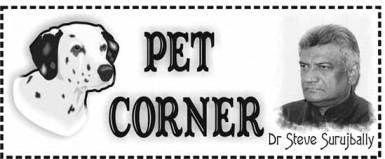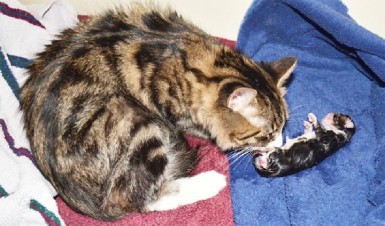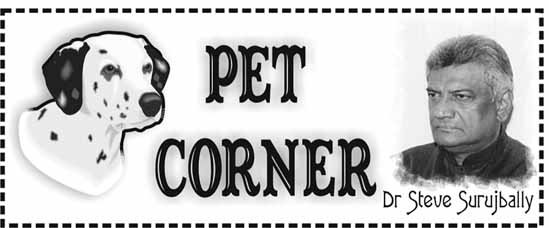Continued
Last week we started sharing some basic information on newborn pups/kittens. Let us continue with some more of this data.
Newborn puppies/kittens, like all mammalian newborns, need to suckle on the first milk produced by the mother. This milk which is produced just after the pups/kittens are born is called colostrum. It contains all the nutrients (proteins, minerals, vitamins, fats, etc) needed by the newborn,  but more importantly, the colostrum contains the antibodies against those disease agents (germs) which the mother would have encountered during her life. These antibodies are transferred via the milk into the puppies/kittens and help defend them against those germs that could kill them in their first few weeks of life.
but more importantly, the colostrum contains the antibodies against those disease agents (germs) which the mother would have encountered during her life. These antibodies are transferred via the milk into the puppies/kittens and help defend them against those germs that could kill them in their first few weeks of life.
In addition, it must be understood that the newborn pups and kittens have not much subcutaneous (under the skin) fat. The breakdown of fat releases energy. Since the newborn pups/kittens have little fat, they need the mother’s milk to supply needed energy. Even while the pup/kitten was developing in the womb, its little liver was storing an energy source called glycogen. Later, when the milk is being consumed by the newborn pup/kitten, the glycogen (energy) which is being used up is replaced in the liver. It is important that the newborn suckles and replaces this source of energy, because the liver in the newborn does not enlarge quickly, and therefore does not have a large glycogen reservoir capacity. The brain of the newborn, by comparison, not only grows faster but uses up a lot of energy. It stands to reason then, that if a puppy or kitten has a brain too large in proportion to its liver, then the energy (glycogen) reserves in the liver can’t cope with the needs of the brain, and the puppy/kitten’s survival capability might be severely compromised. Veterinary paediatric researchers have established that the weight of the liver should be at least one-and-a-half times that of the brain. Two to three times more (liver to brain ratio) is ever better.
 Bearing the above in mind, it is therefore important that the glycogen (energy giver) must be sufficient at all times. This means that the lactating mother dog must be fed well, and the newborns must suckle as often as possible. Of course, one great problem arises when the mother has given birth to a large litter (sometimes even more pups/kittens than she has breast/nipples). In this case, the pups and kittens will die, unless you intervene and exchange them at the nipples, or you remove them totally and hand-rear them (see a later column on this subject). Hand-rearing alone is not good, because they might not have received any or enough colostrum.
Bearing the above in mind, it is therefore important that the glycogen (energy giver) must be sufficient at all times. This means that the lactating mother dog must be fed well, and the newborns must suckle as often as possible. Of course, one great problem arises when the mother has given birth to a large litter (sometimes even more pups/kittens than she has breast/nipples). In this case, the pups and kittens will die, unless you intervene and exchange them at the nipples, or you remove them totally and hand-rear them (see a later column on this subject). Hand-rearing alone is not good, because they might not have received any or enough colostrum.
The colostrum contains the antibodies in large molecules. Only at the early stage of the gastro-intestinal development of the pup/kitten can these large molecules be absorbed. That is why it is so important for the mammalian newborn to receive the colostrum within hours/first 2 – 3 days of birth. The kidney function in the newborn is 12 to 25 per cent of what it will be later in life. These immature kidneys are unable to concentrate the urine, which means that it is necessary for puppies to excrete large amounts of dilute urine. This obligatory water loss of the kidneys must be offset by sufficient intake of milk, or in the case of puppies raised by hand, by a formula containing adequate amounts of water (see later column).
Please implement disease preventative measures (vaccinations, routine dewormings, monthly anti-heartworm medication, etc) and adopt-a-pet from the GSPCA’s Animal Clinic and Shelter at Robb Street and Orange Walk, if you have the wherewithal to care well for the animals. Do not stray your unwanted pets, take them to the GSPCA’s Clinic and Shelter instead. If you do not wish your pet to have puppies or kittens, you may exploit the GSPCA’s free spay and neutering programme. If you see anyone being cruel to an animal, or if you need any technical information, please get in touch with the Clinic and Shelter by calling 226-4237.










